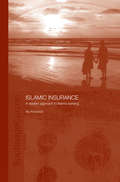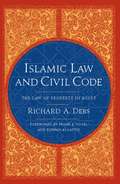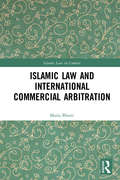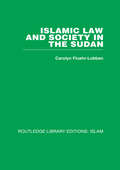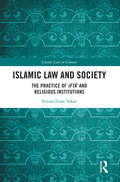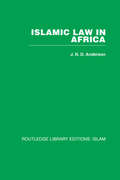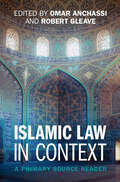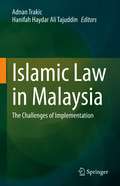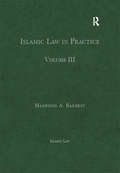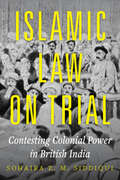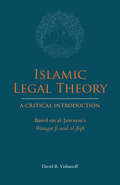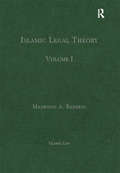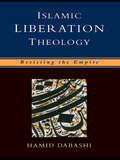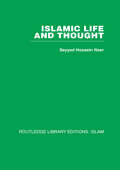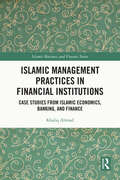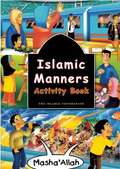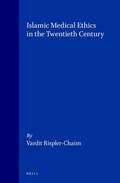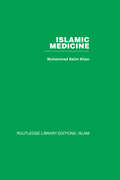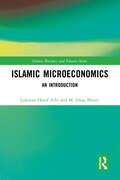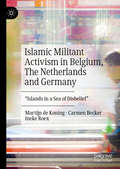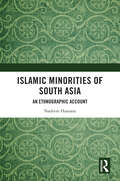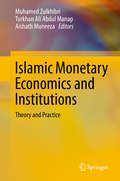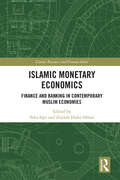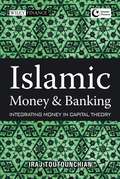- Table View
- List View
Islamic Insurance: A Modern Approach to Islamic Banking (Islamic Studies)
by Aly KhorshidSome Muslims believe insurance is unnecessary, as society should help its victims. Muslims can no longer ignore the fact that they live, trade and communicate with open global systems, and they can no longer ignore the need for banking and insurance. Aly Khorshid demonstrates how initial clerical apprehensions were overcome to create pioneering Mus
Islamic Law and Civil Code: The Law of Property in Egypt
by Richard DebsRichard A. Debs analyzes the classical Islamic law of property based on the Shari'ah, traces its historic development in Egypt, and describes its integration as a source of law within the modern format of a civil code. He focuses specifically on Egypt, a country in the Islamic world that drew upon its society's own vigorous legal system as it formed its modern laws. He also touches on issues that are common to all such societies that have adopted, either by choice or by necessity, Western legal systems.Egypt's unique synthesis of Western and traditional elements is the outcome of an effort to respond to national goals and requirements. Its traditional law, the Shari'ah, is the fundamental law of all Islamic societies, and Debs's analysis of Egypt's experience demonstrates how Islamic jurisprudence can be sophisticated, coherent, rational, and effective, developed over centuries to serve the needs of societies that flourished under the rule of law.
Islamic Law and International Commercial Arbitration (Islamic Law in Context)
by Maria BhattiThis book examines the intersection between contemporary International Commercial Arbitration and Shariʿa law in order to determine possible tensions that may arise between the two systems. It develops evidentiary and procedural rules under Shariʿa, as well as examining the consequences of stipulating qualifications of arbitrators based on gender and/or religion. The author extensively analyses the prohibition against interest (riba) and uncertainty (gharar) under Shariʿa and its impact on arbitration agreements, arbitral awards and public policy. The book also explores the prohibition against riba in light of international conventions, such as the United Nations Convention on Contracts for the International Sale of Goods. Case studies in the book include the Asian International Arbitration Centre, formerly the Kuala Lumpur Regional Centre for Arbitration, and the International Islamic Centre for Reconciliation and Arbitration, as well as the ‘Shari’a Standards’ developed by the Accounting and Auditing Organization for Islamic Financial Institutions. The book will be a valuable resource for academics, students and practitioners working in the areas of Islamic law and the Islamic finance industry.
Islamic Law and Society in the Sudan
by Carolyn Fluehr-LobbanFew studies exist which deal with Islamic law in practice, and this is among the first such studies in the English language for Islamic Africa. It is significant that the present study was completed just prior to the extension of Islamic law as the sole governing law in the Sudan in 1983, for it captures many essentials of the Shari’a as it has been applied for decades prior to this important change. Numerous movements for reform and change are discussed in the book, which reflect the contemporary debate in the Sudan over the position of Shari’a in society.
Islamic Law and Society: The Practice Of Iftā’ And Religious Institutions (Islamic Law in Context)
by Emine Enise YakarThis book places context at the core of the Islamic mechanism of iftā’ to better understand the process of issuing fatwās in Muslim and non-Muslim countries, thus highlighting the connection between context and contemporaneity, on one hand, and the adaptable perception of Islamic law, on the other. The practice of iftā’ is one of the most important mechanisms of Islamic law that keeps Islamic thought about ethical and legal issues in harmony with the demands, exigencies and developments of time. This book builds upon the existing body of work related to the practice of iftā’, but takes the discussion beyond the current debates with the intent of unveiling the interaction between Islamic legal methodologies and different environmental contexts. The book specifically addresses the three institutions (Saudi Arabia’s Dār al-Iftā’, Turkey’s Diyanet and America’s FCNA) and their Islamic legal opinions (fatwās) in a comparative framework. This demonstrates the existence of complex and diverse ideas around similar issues within contemporary Islamic legal opinions that is further complicated by the influence of international, social, political, cultural and ideological contexts. The book thus unveils a more complicated range of interactive constituents in the process of the practice of iftā’ and its outputs, fatwās. The work will be of interest to academics and researchers working in the areas of Islamic law, Middle Eastern studies, religion and politics.
Islamic Law in Africa
by J N AndersonIn many parts of Africa three different systems of laws are concurrently applied – the imported "Colonial" law, the indigenous customary law and Islamic law. In some countries the customary and the Islamic law are kept separate and distinct, while in others they are fused into a single system. This volume represents a unique survey of the extent to which Islamic law is in fact applied in those parts of East and West Africa which were at one time under British administration. It examines the relevant legislation and case law, much of which has never appeared in any Law Reports; the judges and courts which apply it and the problems to which its application give rise.
Islamic Law in Context: A Primary Source Reader
by Robert Gleave Omar AnchassiThis volume surveys the diversity of Islamic legal thought and practice, a 1500 - year tradition that has been cultivated throughout the Islamic world. It features translations of Islamic legal texts from across the spectrum of literary genres (including legal theory, judicial handbooks, pamphlets) that represent the range of temporal, geographic and linguistic contexts in which Islamic law has been, and continues to be, developed. Each text has been chosen and translated by a specialist. It is accompanied by an accessible introduction that places the author and text in historical and legal contexts and explains the state of the relevant field of study. An introduction to each section offers an overview of the genre and provides a useful bibliography. The volume will enable all researchers of Islamic law - established academics, undergraduate students, and general readers - to understand the tremendous and sometimes bewildering diversity of Islamic law, as well the continuities and common features that bind it together.
Islamic Law in Malaysia: The Challenges of Implementation
by Adnan Trakic Hanifah Haydar Ali TajuddinThis book examines the challenges of the implementation of Islamic law in Malaysia. Malaysia is a pertinent jurisdiction to explore such challenges given its global focus, colonial history and institutions, and the intersection of the Shari’ah and secularism/multiculturalism. The resultant implementation challenges are underpinned by three factors that make Malaysia an important jurisdiction for those interested in understanding the place of Islamic law in the global context. First, Malaysia is often considered as a model Islamic country. Islamic law is a source of law in Malaysia. The Islamic law legal system in Malaysia operates in parallel with a common law legal system. The two systems of law generally are in harmony with one another. Nevertheless, occasional cross-jurisdictional issues do arise, and when they do, the Malaysian judiciary has been quite efficient in solving them. The Malaysian experience in maintaining such harmony between the two legal systems provides lessons for a number of countries facing such challenges. Second, Malaysia has a developed Shari’ah court system that interprets and applies Islamic law predominantly based on the Shafi’i school of thought. While, for the most part, the approach has been successful, there have been times when the implementation of the law has raised concerns as to the compatibility of Islamic law with modern principles of human rights and common law-based values. Third, there have been cases where Islamic law implementation in Malaysia has gained global attention due to the potential for wider international implications. To do justice to this complex area, the book calls on scholars and practitioners who have the necessary expertise in Islamic law and its implementation. As such, this book provides lessons and direction for other countries that operate a dual system of secular and Islamic laws.
Islamic Law in Practice: Volume III (Islamic Law)
by Mashood A. BaderinIslamic law influences the lives of Muslims today as aspects of the law are applied as part of State law in different forms in many areas of the world. This volume provides a much needed collection of articles that explore the complexities involved in the application of Islamic law within the contemporary legal systems of different countries today, with particular reference to Saudi Arabia, Morocco, Indonesia, Nigeria, Turkey, Malaysia and Pakistan. The articles identify the relevant areas of difficulties and also propose possible ways of realising a more effective and equitable application of Islamic law in the contemporary world. The volume features an introductory overview of the subject as well as a comprehensive bibliography to aid further research.
Islamic Law on Trial: Contesting Colonial Power in British India
by Dr. Sohaira Z. SiddiquiPrior to the East India Company’s establishment in India in 1661, Islamic law was widely applied by the Mughal Empire. But as the Company’s power grew, it established a court system intended to limit Islamic law. Following the Great Rebellion of 1857, the decentralized Islamic legal system was replaced with a new standardized system. Islamic Law on Trial interrogates the project of juridical colonization and demonstrates that alongside—and despite—the violent displacement of Muslim legal sovereignty, Muslims were able to engage with and even champion Islamic law from inside the colonial judiciary. The outcome of their work was a paradoxical legal terrain that appeared legitimate to both Muslim practitioners and English colonizers. Sohaira Siddiqui challenges long-standing assumptions about Islamic law under British rule, the ways in which colonial power displaced preexisting traditions, and how local Muslim elites navigated the new institutions imposed upon them.
Islamic Law, Gender, and Social Change in Post-Abolition Zanzibar
by Elke E. StockreiterAfter the abolition of slavery in 1897, Islamic courts in Zanzibar (East Africa) became central institutions where former slaves negotiated socioeconomic participation. By using difficult-to-read Islamic court records in Arabic, Elke E. Stockreiter reassesses the workings of these courts as well as gender and social relations in Zanzibar Town during British colonial rule (1890-1963). She shows how Muslim judges maintained their autonomy within the sphere of family law and describes how they helped advance the rights of women, ex-slaves, and other marginalised groups. As was common in other parts of the Muslim world, women usually had to buy their divorce. Thus, Muslim judges played important roles as litigants negotiated moving up the social hierarchy, with ethnicisation increasingly influencing all actors. Drawing on these previously unexplored sources, this study investigates how Muslim judges both mediated and generated discourses of inclusion and exclusion based on social status rather than gender.
Islamic Legal Theory: Based on al-Juwayni's Waraqat fi usul al-fiqh
by David R. VishanoffDavid Vishanoff&’s thorough and original unpacking of the Sunnī jurist al-Juwaynī&’s (1028–1085) Kitāb al-Waraqāt fī uṣūl al-fiqh introduces English-speaking readers to the main concepts, terms, principles, and functions of the classical Islamic discipline of legal theory. This volume offers an ideal entry to the otherwise dense and complex mainstream Sunnī views that dominated Islamic legal thought in al-Juwaynī&’s day—and that are still widely accepted today. A critical edition of al-Juwaynī&’s Arabic text is also included.
Islamic Legal Theory: Volume I (Islamic Law)
by Mashood A. BaderinIslamic legal theory (usÅ«l al-fiqh) is literally regarded as ’the roots of the law’ whilst Islamic jurists consider it to be the basis of Islamic jurisprudence and thus an essential aspect of Islamic law. This volume addresses the sources, methods and principles of Islamic law leading to an appreciation of the skills of independent juristic and legal reasoning necessary for deriving specific rulings from the established sources of the law. The articles engage critically with relevant traditional views to enable a diagnostic understanding of the different issues, covering both SunnÄ« and ShÄ«’Ä« perspectives on some of the issues for comparison. The volume features an introductory overview of the subject as well as a comprehensive bibliography to aid further research. Islamic legal theory is a complex subject which challenges the ingenuity of any expert and therefore special care has been taken to select articles for their clarity as well as their quality, variety and critique to ensure an in-depth, engaging and easy understanding of what is normally a highly theoretical subject.
Islamic Liberation Theology: Resisting the Empire
by Hamid DabashiThis book is a radical piece of counter-intuitive rethinking of the clash of civilizations theory and global politics. In this richly detailed criticism of contemporary politics, Hamid Dabashi argues that after 9/11 we have not seen a new phase in a long running confrontation between Islam and the West, but that such categories have in fact collapsed and exhausted themselves. The West is no longer a unified actor and Islam is ideologically depleted in its confrontation with colonialism. Rather we are seeing the emergence of the US as a lone superpower, and a confrontation between a form of imperial globalized capital and the rising need for a new Islamic theodicy. The combination of political salience and theoretical force makes Islamic Liberation Theology a cornerstone of a whole new generation of thinking about political Islamism and a compelling read for anyone interested in contemporary Islam, current affairs and US foreign policy. Dabashi drives his well-supported and thoroughly documented points steadily forward in an earnest and highly readable style.
Islamic Life and Thought
by Seyyed Hossein NasrThis collection of essays by one of the best known contemporary Muslim scholars writing in English covers many facets of Islamic life and thought. The author has brought together studies dealing with the practical as well as intellectual aspects of Islam in both their historical and contemporary reality. The contemporary significance of themes such as religion and secularism, the meaning of freedom, and the tradition of Islamic science and philosophy is given particular attention.
Islamic Management Practices in Financial Institutions: Case Studies from Islamic Economics, Banking and Finance (Islamic Business and Finance Series)
by Khaliq AhmadThis book draws on a range of theoretical foundations, approaches and management practices that are culturally and jurisdictionally appropriate in several Muslim countries. As such, it contributes to an emerging specialism in comparative management and leadership theory that is oriented toward a broader and more diverse set of perspectives, particularly from the non-Western world, given that the importance of values, ethics, and culture have recently been recognized as a key contributing factor to management knowledge development. The author offers an in-depth overview of the Islamic management strategies that have successfully been implemented in selected Malaysian banking and non-banking financial institutions and then outlines how the application of such strategies leads to increased integrity, efficiency and performance. The book is divided into three parts. The first part deals with the introduction, historical background and methods used in collection of data. The second part consists of a range of real-world case studies, while part three deals with the approaches to be used in the teaching of these cases followed by conclusions and recommendations. These cases studies map the strategic aspects of organizational structure and illustrate the motives that influence Malaysian managers’ choices in seeking specific responses to the situations at hand, which are in harmony with the traditions in Islamic inquiry. As such, management scholars can build a foundation for conceptual and theoretical propositions relevant to Muslim culture and environment that will have practical significance. The book provides a wealth of information and enables researchers not only to identify the determinants of knowledge structure and its context but also the evolution of practice.
Islamic Manners Activity Book
by Fatima D'OyenLearn a selection of Arabic prayers and expressions while having fun with sixty-plus pages of imaginative activities that will introduce young children to a range of practices from Islam and the Muslim world. The Islamic Manners Activity Book includes puzzles, word searches, coloring pages, connect-the-dots, and matching cards that will occupy and entertain children for hours. <p><p> Fatima D'Oyen was born in New York in 1960 and embraced Islam in 1979. An author of several books for Muslim children, she has also been active in Islamic education since 1983 in the United States and Europe in a variety of capacities. Currently she is director of Manara Education, a UK-based social enterprise promoting holistic approaches to Islamic education and parenting.
Islamic Medical Ethics In The Twentieth Century
by C. A. O. van NieuwenhuijzeConsiders prominent issues in medical ethics in the 20th century, such as abortion, artificial insemination, organ transplantation, euthanasia as discussed by Muslim religious scholars, physicians and jurists. Despite the semi-equal spread of medical knowledge among the peoples of the world and the shared dilemmas brought about by modern medicine, Muslims tend to follow their own medical ethics, which agree ultimately with the basic requirements of Islamic religion and law.
Islamic Medicine
by Muhammad Salim KhanOriginally published in 1986, this volume deals with the historical, philosophical and psychological concepts found in Islamic medical practices, and covers Islamic ideas on physiological, pathological, curative and preventative medicine. This was the first systematic study of Islamic medicine to be published in the English language and continues to have much relevance at a time when interest both in Islamic thought and in alternatives to conventional medicine is strong.
Islamic Microeconomics: An Introduction (Islamic Business and Finance Series)
by M. Ishaq Bhatti Lukman Hanif ArbiThis book bridges the gap between Islamic and conventional (micro)economics by demonstrating how modern tools and theories of microeconomics can be applied to Islamic assumptions regarding economics and finance. In contrast to the tendency for Islamic economics and finance proponents to use qualitative and normative approaches based on idealistic assumptions, this book demonstrates how one can instead construct analytical models of Islamic economics and finance and simply compare the implications with those predominant in today’s world. This book also offers extensive literature reviews demonstrating that for a long time, the gap between Islamic and conventional economics and finance is not as wide as previously thought, allowing those with an interest in both fields to participate more effectively and meaningfully in the ongoing discourse between the two fields. The authors conceptualize a general approach and apply it to basic consumer theory. More advanced microeconomic ideas are then discussed, culminating in demonstrations of how contract theory can facilitate a deeper analysis and appreciation of Islamic financial securities. A wide spectrum of academic literature on both Islamic and conventional economics and finance is drawn upon to facilitate a better appreciation for both fields and to inspire future works comparing the two in a more objective manner.
Islamic Militant Activism in Belgium, The Netherlands and Germany: "Islands in a Sea of Disbelief"
by Martijn de Koning Carmen Becker Ineke RoexBased on ethnographic research in Belgium, The Netherlands, and Germany, this book presents a novel approach to studying Muslim militant activism. While much existing research focuses on the process of radicalization, these authors introduce a different set of questions that investigate specific modes of activism, and their engagement with dominant discourses and practices in media and state policies. Drawing on social movement theory and Foucault’s work on counter-conduct, this research explores how daʿwa networks came about, and how activists developed themselves in interaction with state and media practices. This perspective highlights a form of activism and resistance in which activists turn against policies and debates centring on Muslims and Islam, while attempting to create and protect an alternative space for themselves in which they can experience Islam according to their own perception of it. The study will contribute to debates about resistance, social movements and militant activism among Muslims in Europe.
Islamic Minorities of South Asia: An Ethnographic Account
by Nadeem HasnainIslam and Islamicate South Asia have generated interest since 9/11 as never before. However, Islamic Minorities, specifically, is still a relatively neglected area of study in South Asian Islam. It may be due to the reason that there has been a tendency to look at Islam as a monolithic faith and Muslims as a monolithic population to the western world.This book focuses on such Islamic Minorities as the Shias (dominant Isna Ashari/Twelver Shias), Ismaili Khoja, Dawoodi Bohra, and Ahmedia/Qadiyani communities and looks at them from the perspective of their interaction with Hindu cultures and traditions. Written in lucid language from a sociological perspective, it should be an important contribution to the field of “Lived Islam” or “Islam in Practice.”This book will be invaluable to all those interested in the religion, society, and culture of Muslim South Asia.
Islamic Monetary Economics and Institutions: Theory and Practice
by Muhamed Zulkhibri Turkhan Ali Abdul Manap Aishath MuneezaThis edited volume explores theoretical and empirical issues related to monetary economics and policy in the Islamic financial system. Derived from the Conference on Islamic Monetary Economics and Institutions: Theory and Practice 2017 held in Malé, Maldives, the enclosed papers highlights several option for authorities and regulatory bodies regarding monetary policy and regulation, as well as discussing how Islamic monetary policy effects growth, financial stability and resilience to shocks in practice. The inter-linkage between Islamic monetary policy and other markets are also explored. The subject of Islamic economics has gained considerable attention in the last four decades with the emergence of Islamic financial institutions around the world. This phenomenon has motivated economists to develop a comprehensive theoretical framework of modern monetary economics for Islamic economic system. An important characteristic of the Islamic economic system is the abolition of interest from the financial system. Islamic monetary economics is distinguished from conventional monetary economics due to the absence of interest. Therefore, under the Islamic economic system, monetary policy has to depend on other tools. In the early theoretical literature on Islamic monetary economics, many have discussed the role of money in Islamic economics system, while the number of empirical studies on Islamic monetary economics is a relatively new phenomenon. According to Islamic scholars, there are three main goals of Islamic monetary policy: a) economic well-being with full employment and optimum rate of economic growth; b) socioeconomic justice and equitable distribution of income and wealth and c) stability in the value of money. Hence, the Islamic monetary policy has several socioeconomic and ethical implications. Featuring regional case studies, this book serves as a valuable resource for academics, scholars, practitioners and policy makers in the areas of Islamic economics and finance.
Islamic Monetary Economics: Finance and Banking in Contemporary Muslim Economies (Islamic Business and Finance Series)
by Taha Eğri; Zeyneb Hafsa OrhanThe existence of fiat currencies has long been cited as one of the major contributing factors to the challenges facing contemporary economies, and the current monetary system is not only a key source of exorable increases in interest rates but also a principal cause of inflation and decline in the value of money in many countries. The editors argue that an Islamic monetary system, with its specific money concepts, interest-free financial institutions, and monetary policy embedded in real growth, provides a solution to this conundrum. Contributions from many world-renowned experts consider a wide array of topics, ranging from the theoretical concepts of money and banking in conventional and Islamic economics to the historical journey of money from precious metals to plastic money and digital currency today. The book outlines the problems that sprout from interest-based banking and multiple debt structures. It then mirrors the Islamic concepts of money as well as idiosyncrasies of its monetary policy. Supported with meticulous research and empirical evidence, the book demonstrates the efficacy of Islamic monetary system in delivering real growth along with equitable distribution of wealth and prosperity in the economy. It additionally acquaints the readers with juristic debates about money and monetary policy. This is essential reading for both students and researchers in Islamic economics, banking, and finance, expertly promoting a fair and just economic system that emerges as a result of interest-free banking and monetary policy based on Islamic principles.
Islamic Money and Banking
by Dr Iraj ToutounchianThis book examines how money, in the absence of interest (Riba) and money market can become an endogenous variable of an economic system. It further tries to integrate money in capital theory and to make monetary sector part of the real sector aiming at removing the problems that arise from separation of the two.
